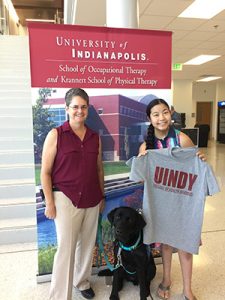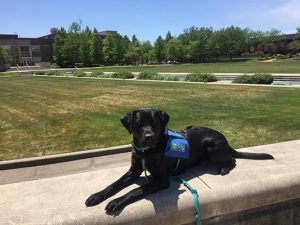Service dog training program builds community connections for UIndy professor


Helping people with disabilities live a better life is the goal of many physical therapists. Kathy Martin, professor in the Krannert School of Physical Therapy, has found a unique way to enhance that mission by training service dogs.
Martin, who has served in several leadership roles within the Krannert School of Physical Therapy since joining the University of Indianapolis in 1999, started volunteering in 2017 to “furlough” service dogs in training through the Indiana Canine Assistant Network (ICAN). Since then, she has furloughed five dogs, with another canine due to arrive in August.
The ICAN program works with inmates at three Indiana prisons (Pendleton, CIF and Indiana Women’s Prison) to train the dogs. Because a dog cannot be fully prepared for service in prison, they go on “furloughs” with a trained ICAN volunteer like Martin. She works with each dog for up to four weeks at a time in a real world environment. She then sends a detailed report back to ICAN.
“One key part of the furlougher’s job is to help the dog learn how to be invisible in public. Another significant part of what I do is public education, both about ICAN specifically and how to interact with a service dog in general,” Martin explained.
Once the dog completes training successfully, ICAN places the canine with a client, who could be a child or an adult living with a disability.
As a dog lover who lost her own pup in 2016, Martin said ICAN’s furlough program made perfect sense. Although it can be an intense four weeks, the short time frame allows Martin flexibility. She not only enjoys spending time with the canines-in-training, but also talking about ICAN’s mission and the positive impact on clients as well as their inmate handlers, who learn communication skills, patience and empathy.
“Dogs feed my soul and I need to be around a dog every once in a while,” Martin said. “I also got involved because as a physical therapist, I have personally seen the life-changing work these dogs do.”
Martin provided the example of a kindergartner with cerebral palsy who was unable to sit on the floor at circle time with the other children. In his wheelchair, he was two feet above the other students. His first service dog, which was trained to prop up the boy as he sat on the floor, changed all that.
“With his dog, this boy was able to join his peers on the floor at circle time. As a physical therapist, no matter how good I am, I was never going to be able to give this child the independence and ability to join his friends that the service dog gave him,” she said.
Martin said she has found synergy between training service dogs and her professional work as a pediatric physical therapist, where her goal is to help a child and the family maximize the child’s potential. As a physical therapy educator, I also get to help my students understand the role of service dog for their future patients.
“Sometimes I accomplish that with the actual therapy I do with the child, or it may come through what I teach the parents/caregivers to do. Helping to train a service dog to assist someone with a disability is very similar. It is providing the tools a person needs to be more engaged in life,” she explained.

Martin’s most recent furlough was a dog named Koontz, who is now back with his handler at the Indiana Women’s Prison. Named for the Howard County Deputy Carl Koontz who was killed in the line of duty in 2016, Martin said training Koontz was a unique experience.
“It is very special to have the Koontz name attached to an ongoing effort to serve and protect. Of all the dogs I have had, Koontz was the hardest to say goodbye to. He is calm, confident, and focused. He just loves to work and works very hard to get it right. From my detective friend who knew Carl, she said he was the same way. Koontz will be an amazing service dog and will totally change someone’s life. I felt honored to get to be along for the part of the journey!” Martin said.
Learn more about ICAN
Written by Sara Galer, Senior Communications Specialist, University of Indianapolis. Contact newsdesk@uindy.edu with your campus news.
